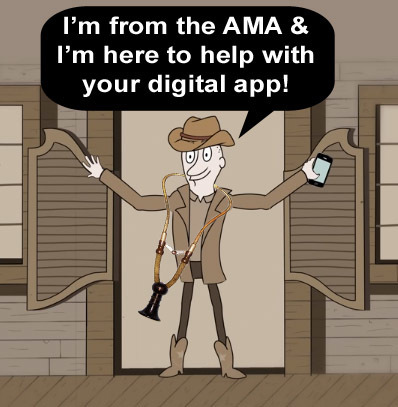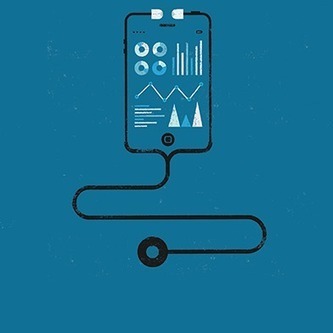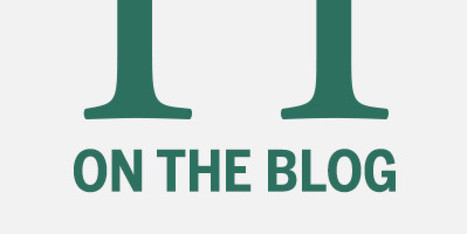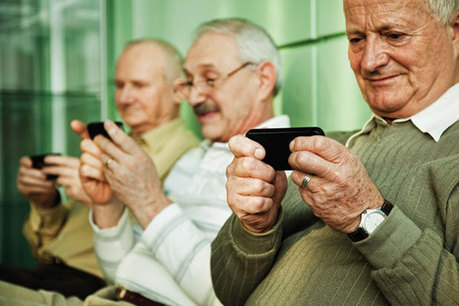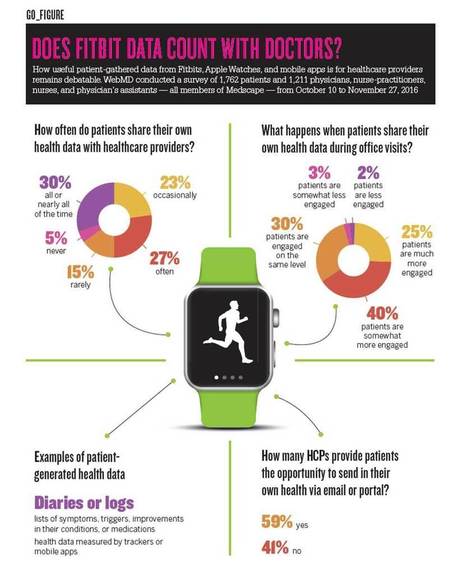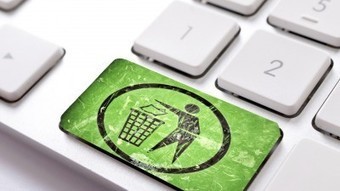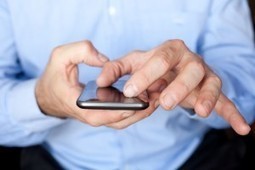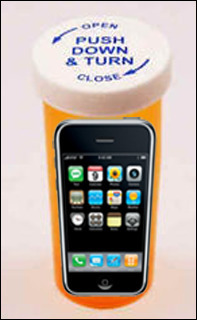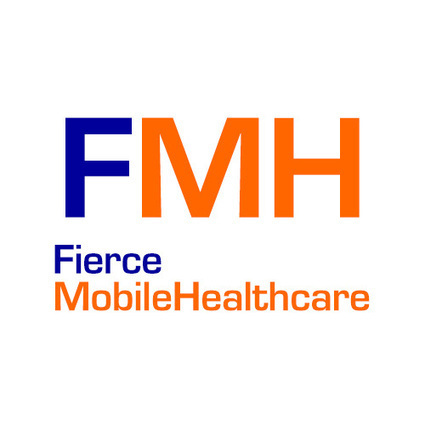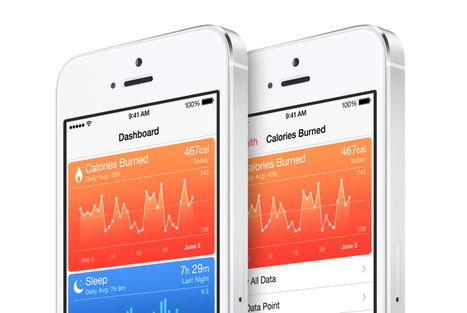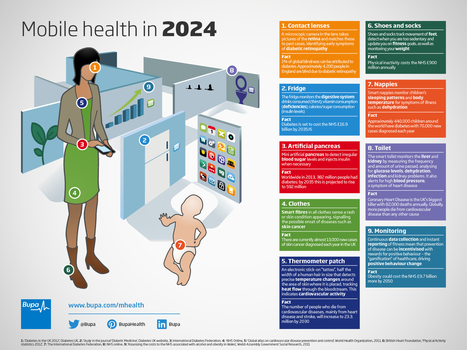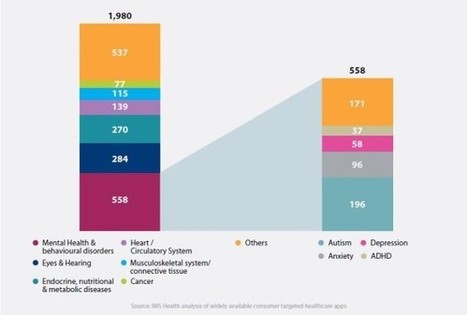 Your new post is loading...
 Your new post is loading...
- The world's largest technology companies have all hired well-known cardiologists.
- Heart disease and high blood pressure affect a large number of people, are well-understood, and there's evidence that consumer products can help.
Big Silicon Valley companies have often competed for talent with specialized skills, like expertise in artificial intelligence or trendy new programming languages. Now they're competing for heart doctors. Apple, Alphabet, and Amazon have all hired well-known cardiologists. This might just be a coincidence. Cardiologists tend to be well educated and hard working, and big tech companies have a track record of recruiting such people. In recent years, all of these companies have started to invest in products and devices that are targeted to millions of people who could benefit by tracking their heart health. Apple's smartwatch now includes an electrocardiogram, which can detect heart rhythm irregularities. Verily's study watch, which is designed for clinical trial research, also tracks heart rate and heart rhythm, and it's doing a lot of work in chronic disease management. So the more likely explanation is that tech companies are interested in health care, and they have all come to the conclusion that cardiology should be an early (if not initial) target. Here's why. It's a huge potential market Heart disease is the No. 1 killer in the world, and strokes are among the leading causes of death. And that's not all that cardiologists treat. "Our scope covers other common disease such as high blood pressure, which impacts about a third of people in the U.S. — 75 million Americans — as well as lipid and cholesterol disorders," said Dr. Mo Elshazly, a cardiologist and assistant professor of medicine at Weill Cornell Medicine. Many cardiologists are also experts in nutrition and exercise science, which impacts a huge number of people who are committed to staying healthy. That's useful for the teams within the largest tech companies that are more focused on wellness and fitness applications, rather than on health and medical. Alphabet has Google Fit. Apple has a fitness group for its Apple Watch. And Amazon is looking at health and wellness applications for its Alexa voice assistant. It's well-studied Cardiology is among the most-studied fields in medicine, meaning there's already a lot of evidence to understand the root causes of heart disease, as well as how to prevent it. That's attractive for tech companies, which tend to base their development decisions on data. Their consumer products are already making a difference Let's take Apple, as an example. The company launched its first Apple Watch model with a heart rate sensor, never expecting that people would use it to discover they were pregnant, at risk for a heart attack or experiencing a dangerous irregular heart rhythm. But as people began sharing examples of how the Apple Watch saved their life, the company started to invest heavily in the science and technology to drive more of these stories. A lot of that work culminated in the first-ever clearance for a heart rhythm sensor called an ECG for Apple Watch earlier in the summer. read more at https://www.cnbc.com/2018/10/17/what-every-tech-company-needs-a-cardiologist.html
Via nrip
The American Medical Association has signaled its support for mHealth with new policies designed to support physicians adopting mobile health apps and devices. While approving an eight-part set of mHealth principles at its mid-year meeting this past week, the AMA also called for better regulation of apps – especially those which don’t fall under federal review – and told doctors to seek a legal opinion if an app’s security is questionable. “While some mobile apps and devices are subject to FDA regulation, others are not, and do not undergo rigorous evaluation before deployment for general use, which raises quality and patient safety concerns,” the AMA’s Council on Medical Service said in a report adopted at last year’s interim meeting. “Without ensuring that there is strong and sufficient evidence that provides clinical validation to mHealth apps and associated devices, trackers and sensors, physicians will not fully integrate mHealth apps into their practices. More investment is needed in expanding the evidence base necessary to show the accuracy, effectiveness, safety and security of mHealth apps.” As reported in AMA News, the organization approved a set of principles dictating that mHealth technology should: - Support the establishment or continuation of a valid patient-physician relationship;
- Have a high-quality clinical evidence base to support its use and ensure mHealth app safety and effectiveness;
- Follow evidence-based practice guidelines, especially those developed and produced by national medical specialty societies and based on systematic reviews, to ensure patient safety, quality of care and positive health outcomes;
- Support care delivery that is patient-centered, promotes care coordination and facilitates team-based communication;
- Support data portability and interoperability to promote care coordination through medical home and accountable care models;
- Abide by state licensure laws and state medical practice laws and requirements in the state in which the patient receives services facilitated by the app;
- Require that physicians and other health professionals delivering services through the app be licensed in the state where the patient receives services or be providing these services as otherwise authorized by that state’s medical board; and
- Ensure that the delivery of any services via the app be consistent with state scope of practice laws.
Via Pharma Guy
Health care providers are using wearable technology to enhance the clinical outcomes of sufferers of chronic diseases and improve clinician/patient engagement processes.
You’re developing a health app for mobile devices and you want to know which federal laws apply. Check out this interactive tool.
WHAT ARE THE LAWS?
Does your mobile app collect, create, or share consumer information? Does it diagnose or treat a disease or health condition? Then this tool will help you figure out which – and it may be more than one – federal laws apply. It’s not meant to be legal advice about all of your compliance obligations, but it will give you a snapshot of a few important laws and regulations from three federal agencies.
- Health Insurance Portability and Accountability Act (HIPAA)
- Federal Food, Drug, and Cosmetic Act (FD&C Act)
- Federal Trade Commission Act (FTC Act)
- FTC’s Health Breach Notification Rule
WHICH LAWS APPLY TO YOUR MOBILE HEALTH APP? Go here.
Via Pharma Guy
The number of mobile health applications (mHealth apps) available to consumers now surpasses 165,000 (here). One-fifth of smartphone owners had health apps in 2012, and 7% of primary care physicians recommended a health app.
The FDA has even approved the prescribing of mHealth such as the DiabetesManager System, which captures, stores and transmits blood glucose levels.
Unfortunately, many health apps do not have privacy policies informing users of how personal health data is collected, stored, transmitted, and shared with third parties. Even when there are privacy policies, many health apps do not fully inform patients of how their data will be used or shared.
In a study appearing in the March 8 issue of JAMA, Sarah R. Blenner, J.D., M.P.H., of the Illinois Institute of Technology Chicago-Kent College of Law, Chicago, and colleagues examined the privacy policies of Android diabetes apps and the sharing of health information. They found that 81% of the apps did not have privacy policies. Of the apps with privacy policies, only 4 said they would ask users for permission to share data. Read more details here.
Via Pharma Guy
The pharma industry is a hotbed for buzzwords, many of which often disappear as quickly as they spring up. One of the latest is mobile health (mHealth) technologies. A 2015 white paper released by Cutting Edge Information (Understanding the Importance of Mobile Health for Pharma) predicts this technology will not be the latest flash in the pan, though. In fact, as mHealth continues to evolve from new phenomenon to mainstay marketing strategy, the white paper’s authors, Michelle Vitko and Sarah Ray, predict its importance in the pharmaceutical industry will continue to grow.
While numbers do not always reveal the complete story, some of the figures cited in the white paper are pretty telling. In the first quarter of 2014 the total number of mHealth applications available on iOS and Android platforms soared past 100,000 and continues to grow. Even more telling is the fact that during the past 30 months 5,000 of those apps earned revenues greater than $1 million. Mobile strategies now account for 14 percent of marketing mixes of teams that were surveyed.
Other sources seem to back up these findings. Mobile Health Market News predicts clinical mHealth spending will increase $2.5 billion from 2011 to 2016. mHealth Watch estimates the mHealth market will be worth $26 billion by 2017.
The reasons behind the growth of this technology are clear to most: It provides pharma companies the ability to connect with various audiences of strategic importance to them, from patients and caregivers to physicians and pharmacists. In an industry where information is vital and feedback from external partners so critical, the allure is certainly understandable. Still, the paper warns pharma to not overly rely on mobile technologies to achieve desired results. By using these devices to promote medical education and patient adherence, companies may better position themselves to benefit from mHealth in the long run.
Via Pharma Guy
Aplicaciones para mejorar la salud | salud Activa | La Vanguardia
The digital patient is here. From pre-screening potential doctors to viewing their treatment information and tracking their fitness/health data, the digital patient is increasingly embracing mobile health to improve their well-being. Check out the latest infographic from CDW Healthcare to learn about the right of the digital patient.
Via ET Russell, eMedToday, Philippe Marchal
After decades as a technological laggard, medicine has entered its data age. Mobile technologies, sensors, genome sequencing, and advances in analytic software now make it possible to capture vast amounts of information about our individual makeup and the environment around us. The sum of this information could transform medicine, turning a field aimed at treating the average patient into one that’s customized to each person while shifting more control and responsibility from doctors to patients.
The question is: can big data make health care better?
“There is a lot of data being gathered. That’s not enough,” says Ed Martin, interim director of the Information Services Unit at the University of California San Francisco School of Medicine. “It’s really about coming up with applications that make data actionable.”
The business opportunity in making sense of that data—potentially $300 billion to $450 billion a year, according to consultants McKinsey & Company—is driving well-established companies like Apple, Qualcomm, and IBM to invest in technologies from data-capturing smartphone apps to billion-dollar analytical systems. It’s feeding the rising enthusiasm for startups as well.
Venture capital firms like Greylock Partners and Kleiner Perkins Caufield & Byers, as well as the corporate venture funds of Google, Samsung, Merck, and others, have invested more than $3 billion in health-care information technology since the beginning of 2013—a rapid acceleration from previous years, according to data from Mercom Capital Group.
Via nrip
Which apps can be used by chronic cancer patients to help them with their illness and overall health?
There are literally thousands of medical apps in the marketplace and it is very difficult to sift through them and find out which ones are easy to use, practical and helpful.
Joan Justice did some research, asked some patients, and read a lot of reviews to try and get an idea of which ones were helpful for chronic cancer patients and published this...
It includes some of my recommendations: ClinicalTrialsSeek and Pillboxie along with many others...
read the article here : http://healthworkscollective.com/joan-justice/150181/mobile-apps-chronic-cancer-patients
Via nrip
Sixty-three years ago, my grandfather suffered a heart attack.
Via Sam Stern
“ Telemedicine and mHealth apps will adapt more and more to smartphone technology in the future, especially those targeting the senior citizens segment.”
Via ET Russell, eMedToday, Rémy TESTON
“MHealth has tremendous potential, but it requires talented individuals with a wide skill set to shepherd the technology and use cases in the right direction ensuring that end users have a positive experience along the way.”
Via eMedToday
|
A WebMD survey finds that patients are more engaged when they share their own health with their doctors.
Via Pharma Guy
The results of this year’s mHealth App Developer Economics 2016 study show a steep increase in competition level among mHealth app publishers. The supply side of mHealth apps is measured in the number of available apps and publishers. They are growing significantly faster than the demand side which is quantified by the number of mHealth app downloads. The number of mHealth apps and active mHealth app publishers has seen strong growth since 2015. This year, the total number of mHealth apps listed on major app stores across the globe grew by 57% to 259,000 apps. This impressive growth is based on three main developments; the growing number of mHealth app publishers, the increased importance of multi-platform app publishing and the expansion of existing mHealth app portfolios. The number of mHealth app publishers grew in line with the number of apps. There are currently 58,000 mHealth app publishers app on major app stores, 28% more since the beginning of 2015. There appears to be no immediate end to the number of companies rushing into the market to launch their first mHealth app. In contrast, growth rates of mHealth app store downloads are estimated to be only +7% in 2016, having been +35% the previous year, reaching a total of 3.2B in 2016. This is in line with other app market categories and reflects the fact that growth of capable devices that can download apps has slowed down in most western countries. As a consequence of this increased competition, it will be even more difficult to stand out and gain significant downloads. Only 14% of mHealth app publishers generated more than 100,000 downloads with their mHealth app portfolio in one year. With hundreds of new mHealth apps released daily, companies have to consider their app launch as if it were a familiar product in a saturated market.
Via Pharma Guy
Minority of Apps Appear Likely to be Useful in Engaging Patients [Current pharma apps are at the bottom of this pyramid. As you move up the pyramid, pharma would have a more difficult task to develop useful engaging apps for patients.]
A systematic search of the iOS and Android app stores for a broad set of medical conditions revealed 946 iOS apps and 1,173 Android apps. After removing non-health-care, non-patient-facing, non-English, and highly similar apps, 376 iOS apps and 569 Android apps remained (Exhibit 2).
Of the 376 iOS apps:
- 24 (6%) appeared to have limited engagement beyond traditional media
- 66 (18%) were not relevant to the search condition
- 33 (9%) had poor ratings or reviews, 63 (17%) were last updated prior to 2014
- 29 (8%) were otherwise not assessed to be useful.
Of the 569 Android apps:
- 89 (16%) had limited engagement
- 56 (10%) were not relevant to the search condition
- 8 (1%) had poor ratings or reviews, 200 (35%) were last updated prior to 2014
- 64 (11%) were otherwise not assessed to be useful.
In all, 161 (43%) iOS apps and 152 (27%) Android apps were assessed as possibly useful, of which 126 apps existed on both platforms.
Via Pharma Guy
From 2013 to 2015, the number of health and fitness apps available on Apple’s mobile operating system increased by 106%, according to one report.
Although some health apps, such as those that perform EKGs or measure blood glucose levels must be approved by the Food and Drug Administration before reaching the market doctors for the most part are not sold. It has been this author’s experience that HCP’s prefer to conduct their own tests rather than use data from health apps for diagnostic criteria.
Of the 376 iOS apps:
- 24 (6%) appeared to have limited engagement beyond traditional media
- 66 (18%) were not relevant to the search condition
- 33 (9%) had poor ratings or reviews, 63 (17%) were last updated prior to 2014
- 29 (8%) were otherwise not assessed to be useful.
Of the 569 Android apps:
- 89 (16%) had limited engagement
- 56 (10%) were not relevant to the search condition
- 8 (1%) had poor ratings or reviews, 200 (35%) were last updated prior to 2014
- 64 (11%) were otherwise not assessed to be useful.
What will it take to make health apps more useful? Find out here.
Via Pharma Guy
A new study released by mobile engagement provider Mobiquityexposes the “gap between patients’ demand for taking control of their own health and the accessibility or availability of digital and mobile tools when it comes to the management of chronic health conditions.”
The study revealed that one third of patients with chronic diseases don’t currently use mobile apps to manage their conditions, but would like to start.
In fact, the report summary notes, one in four respondents feel that “wearable devices are the way of the future.”
Interestingly, almost 50 percent of patients believe they should bring information/digital tools to their doctor – rather than the other way around – reinforcing their desire to be actively involved in managing their health rather than trust their doctors to exclusively manage it. When asked about the most challenging aspects of managing their conditions, 26 percent of respondents agree that finding direct means of communicating with health professionals presents the biggest hurdle. Other top challenges include:
- Monitoring changes in health (25%)
- Remembering to take medication (20%)
- Keeping up to date with medical advancements, treatments, etc. (18%)
“It’s clear the potential for digital solutions is vast: 40 percent of respondents feel mobile tools play an important role in overall healthcare,” the report summary reads.
Via Pharma Guy
It’s hard to find a pharma or medical device company these days that doesn’t have at least one mobile app in development. And now that, as of February 2015, the U.S. Food and Drug Administration (FDA) has issued guidance on which apps need to be regulated and which ones don’t, it will be interesting to see if this almost exponential development trend continues.
Federal guidance alone doesn’t guarantee an app’s success, and there is still plenty of playing field for developers in the health and wellness space for apps that do not require 510(k) submission. Therefore, developers and marketers alike must keep in mind these three key drivers of mobile health app adoption.
Awareness In a 2014 poll by QuantiaMD, only 37% of physicians surveyed said that they had recommended a mobile app to their patients. In another QuantiaMD poll, 42% of physicians said they would notrecommend a mobile health app to patients because there was no regulatory oversight (though the new FDA guidance should help with this). In addition, another 37% percent had no idea what mobile health apps are out there.
In spite of physicians being split on the utility of apps, consumers are downloading them at a rapid pace. In fact, it is estimated that within the next three years half of all smartphone and tablet users will have at least one mobile health or wellness app, like Lose It!, RunKeeper, or Glucose Buddy. But, downloading doesn’t necessarily mean they are using them! There is enormous opportunity for healthcare marketers to more effectively demonstrate the myriad of app benefits to patients and physicians alike.
More here...
Via Pharma Guy
Today's mobile apps are helping diabetics aggregate blood sugar and nutritional data from multiple platforms and devices and logging data into central portals accessible anywhere, according to Steve Robinson, general manager of the Cloud Platform Services Division for IBM.
The apps and snap-on smartphone monitoring devices are letting physicians integrate biometric data from wearables into patient data and analyze patient data at fast speed, Robinson writes at InformationWeek. The benefits are just as extensive as the functionality being developed, he says The gains include everything from simplifying records and improving doctor-patient conversations to gaining a holistic view of a diabetic's health. Doctors can "crunch and analyze patient data at rapid speeds to help identify patterns and predict future health and treatment needs," he writes. "Mobile apps can help diabetes sufferers get ahead of their symptoms and live healthier, more carefree lives," Robinson says. eBrief | Advice for Healthcare Organizations Seeking to Centralize Patient Records, Decommission Legacy Systems Health systems are transforming their foundations and infrastructures to cut costs and improve care. In this eBook, hospital leaders share challenges and tools to make systemwide decisions that can help boost quality care and outcomes. Download today! Sign up for our FREE newsletter for more news like this sent to your inbox! Diabetes tools have ranged from providing smartphone coaching that is helping diabetics living in low to modest socioeconomic communities manage their disease and improving their health, to a wearable, automated bionic pancreas for continuous glucose monitor and a software algorithm, according to a study at the New England Journal of Medicine. In addition, mobile monitoring of diabetic employees can save more than $3,000 a year in healthcare costs, half of the average annual medical insurance cost for workers diagnosed with diabetes. Today's tools and cloud-based capabilities are reducing those costs while also driving innovation for disease management, Robinson says. "Using cloud services, combined with the ease and convenience of mobile, new methods of managing this disease are being brought to patients around the world," he writes.
For more information:
- read the article Related Articles:
Mobile monitoring tools can cut diabetes management costs in half
Smartphone-powered bionic pancreas outperforms traditional diabetes pump
Smartphone coaching can boost diabetic management, help reduce disease risks
Smartphone app aims for faster, more accurate, body fluid testing
Smartphones may be the next-gen blood test laboratory
Montefiore explores texting for diabetic teens, pre-op care
Via Celine Sportisse, DIRECT MEDICA by Webhelp, dbtmobile
The Food and Drug Administration (FDA), which regulates everything from heart monitors to horse vaccines, will soon have its hands full with consumer health apps and devices.
The vast majority of the health apps you’ll find in Apple’s or Google’s app stores are harmless, like step counters and heart beat monitors. They’re non-clinical, non-actionable, and informational or motivational in nature.
But the next wave of biometric devices and apps might go further, measuring things like real-time blood pressure, blood glucose, and oxygen levels. More clinical apps The FDA is charged with keeping watch on the safety and efficacy of consumer health products. Lately, that includes more clinical apps as well as devices you might buy at the drugstore, like a home glucose testing kit.
“It’s these apps that the FDA says it will regulate,” David Bates of Brigham and Women’s Hospital and Physicians Organization told VentureBeat in June. These apps will have to go through the full 510(k) process,” he said.
Dr. Bates chaired a group to advise the FDA on how to review health apps for approval, and on how the FDA should advise developers. “It was intended to help them think through the risk factors involved with these products and then give guidance on how to stay within the guidelines,” he said.
“The device makers were asking from some guidance from The FDA on what types of things would be accepted and what wouldn’t,” Bates said. Bates believes the FDA wants to use a light regulatory touch when looking at new medical devices. “The FDA definitely wants innovation to continue in clinical devices,” he said. “In general the FDA knows that the vast majority of apps are just informational.”
The FDA’s final guidance focuses on a small subset of mobile apps that present a greater risk to patients if they do not work as intended.
Health apps go mainstream The big software companies (Apple, Google, and Samsung) have brought attention to, and lent credibility to, apps and devices that do more than count steps. These companies are building large cloud platforms designed to collect health data from all sorts of health apps and devices.
more at http://venturebeat.com/2014/07/21/health-apps-are-changing-so-must-the-fda/
Via nrip
An IMS Health report on consumer facing mobile health apps offers an outlook on the future of mobile health technology and has a breakdown of mhealth apps.
Via eMedToday
Dr. Alvin Rajkomar was doing rounds with his team at the University of California, San Francisco Medical Center when he came upon a puzzling case: a frail, elderly patient with a dangerously low sodium level.
Via eMedToday
|



 Your new post is loading...
Your new post is loading...



